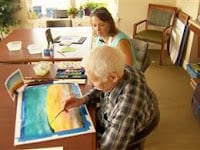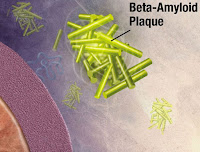Learn about 'personalized music for dementia' and its powerful effect on Alzheimer's. See the Director of the hit film, 'Alive Inside', on the dementia-impact of music.
The antidepressant drug citalopram, also sold under the brand names Celexa and Cipramil, significantly relieves agitation in Alzheimer’s. Learn about the benefits and side-effects.
The brush strokes are precise, the colors vibrant. See a Colorado art program help patients rise above dementia, while the paintings raise money for The Alzheimer's Association.
Researchers in Florida find that robotic pet cats improve mood, behavior and cognition in older adults with mild to moderate dementia. Find out more.
The protein BDNF builds synapses in the human brain, nurturing brain cells and fighting off dementia. While there is no artificial way of boosting it, social and cognitive activity can.
Memory failing? New research shows you may need help, but not for dementia. Memory slips, stress and fatigue are growing in people with healthy memory.
People may not have easy access to sophisticated, expensive dementia tests. A simple test from Einstein Medicine uses a stopwatch and a few questions to determine one's risk of dementia. The potential payoff could be tremendous for individuals, their families and society.
DRINKING beet juice can increase blood flow to the brain in older adults. The way beet juice does this holds great potential for combating dementia.
Ketone-rich diets increase the SIRT3 protein that protects neurons from death during the progression of Alzheimer's disease. But how does it work? Find out more.
People worry about becoming forgetful. Is it the first sign of Alzheimer’s or just the passing years? After all, forgetfulness is a normal part of aging. Check out these quick ways to tell the difference.
Researchers found in a study that people who developed dementia were more likely to have their credit rating drop at least two and a half years before the diagnosis. Some had problems managing their money up to six years before. Find out more.
Scientists say restoring a brain protein, not removing amyloid plaques, should be the target of Alzheimer's dementia therapies. The researchers said treatment might lie in normalizing the levels of a specific brain protein.
















